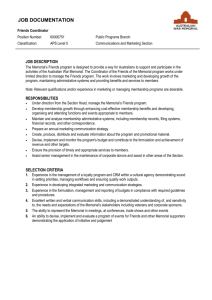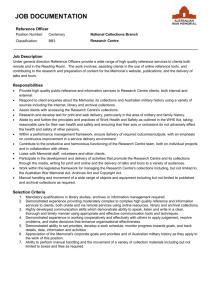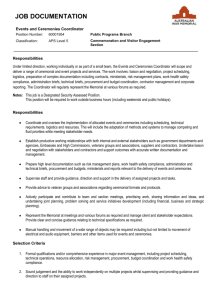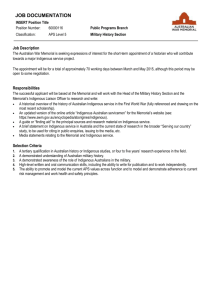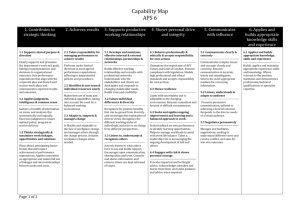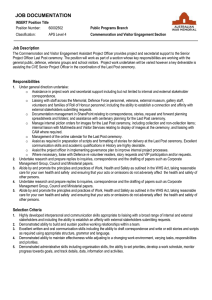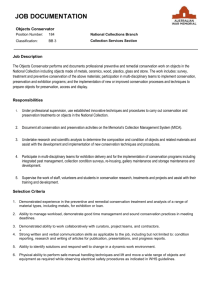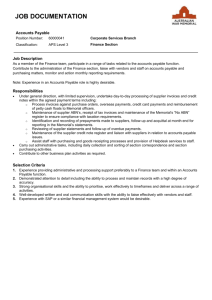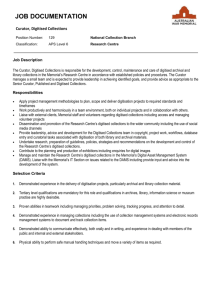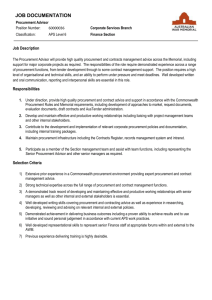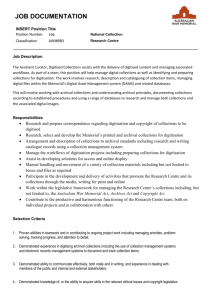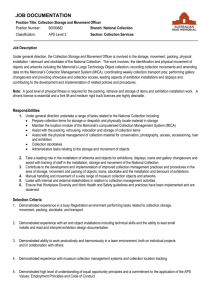JOB DOCUMENTATION - Evaluation and Visitor Research Officer
advertisement
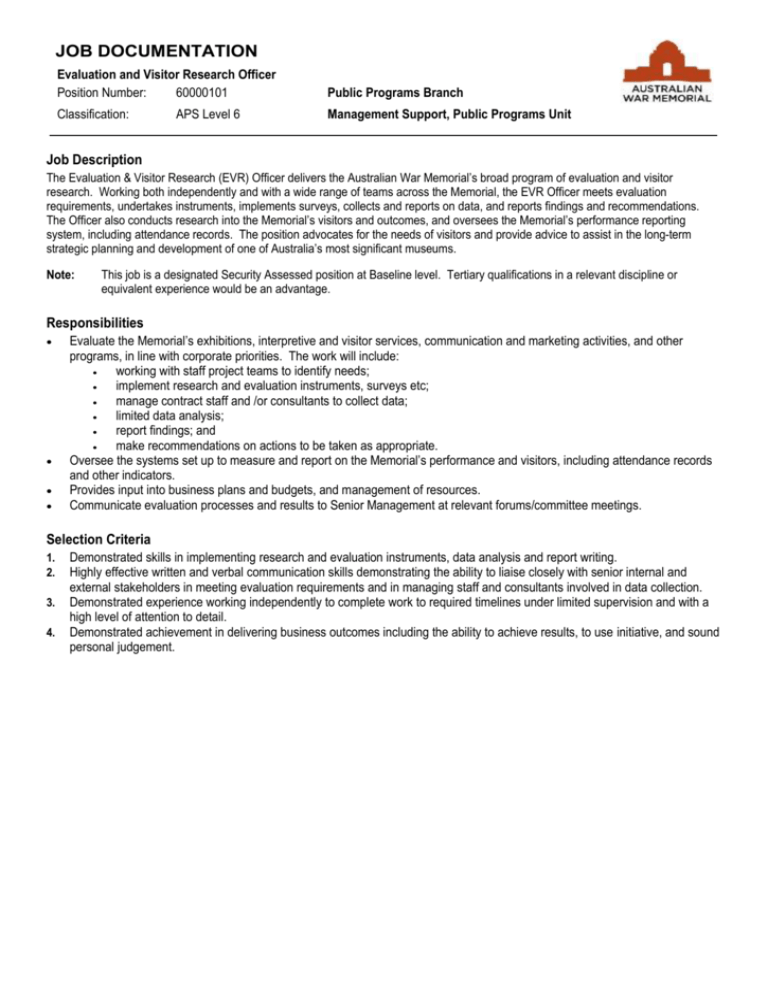
JOB DOCUMENTATION Evaluation and Visitor Research Officer Position Number: 60000101 Public Programs Branch Classification: Management Support, Public Programs Unit APS Level 6 Job Description The Evaluation & Visitor Research (EVR) Officer delivers the Australian War Memorial’s broad program of evaluation and visitor research. Working both independently and with a wide range of teams across the Memorial, the EVR Officer meets evaluation requirements, undertakes instruments, implements surveys, collects and reports on data, and reports findings and recommendations. The Officer also conducts research into the Memorial’s visitors and outcomes, and oversees the Memorial’s performance reporting system, including attendance records. The position advocates for the needs of visitors and provide advice to assist in the long-term strategic planning and development of one of Australia’s most significant museums. Note: This job is a designated Security Assessed position at Baseline level. Tertiary qualifications in a relevant discipline or equivalent experience would be an advantage. Responsibilities Evaluate the Memorial’s exhibitions, interpretive and visitor services, communication and marketing activities, and other programs, in line with corporate priorities. The work will include: working with staff project teams to identify needs; implement research and evaluation instruments, surveys etc; manage contract staff and /or consultants to collect data; limited data analysis; report findings; and make recommendations on actions to be taken as appropriate. Oversee the systems set up to measure and report on the Memorial’s performance and visitors, including attendance records and other indicators. Provides input into business plans and budgets, and management of resources. Communicate evaluation processes and results to Senior Management at relevant forums/committee meetings. Selection Criteria 1. 2. 3. 4. Demonstrated skills in implementing research and evaluation instruments, data analysis and report writing. Highly effective written and verbal communication skills demonstrating the ability to liaise closely with senior internal and external stakeholders in meeting evaluation requirements and in managing staff and consultants involved in data collection. Demonstrated experience working independently to complete work to required timelines under limited supervision and with a high level of attention to detail. Demonstrated achievement in delivering business outcomes including the ability to achieve results, to use initiative, and sound personal judgement. JOB DOCUMENTATION Evaluation and Visitor Research Officer Position Number: 60000101 Public Programs Branch Classification: Management Support, Public Programs Unit APS Level 6 Capabilities Supports strategic direction Achieves results Supports productive working relationships Displays personal drive and integrity Communicates with influence Supports shared purpose and direction Identifies and uses resources wisely Nurtures internal and external relationships Demonstrates public service professionalism and probity Communicates clearly Understands, supports and promotes the organisation's vision, mission, and business objectives. Identifies the relationship between organisational goals and operational tasks. Clearly communicates goals and objectives to others. Understands, supports and communicates the reasons for decisions and recommendations. Reviews project performance and identifies opportunities for improvement. Makes effective use of individual and team capabilities and negotiates responsibility for work outcomes. Is responsive to changes in requirements. Builds and sustains positive relationships with team members, stakeholders and clients. Proactively offers assistance for a mutually beneficial relationship. Anticipates and is responsive to client and stakeholder needs and expectations. Adopts a principled approach and adheres to the APS Values and Code of Conduct. Acts professionally at all times and operates within the boundaries of organisational processes and legal and public policy constraints. Operates as an effective representative of the organisation in internal forums. Thinks strategically Understands the work environment and initiates and develops team goals, strategies and work plans. Identifies broader factors, trends and influences that may impact on the team’s work objectives. Considers the ramifications of issues and longer-term impact of own work and work area. Harnesses information and opportunities Gathers and investigates information from diverse sources and explores new ideas and different viewpoints. Uses experience to analyse what information is important and how it should be used. Maintains an awareness of the organisation and keeps self and others well informed on work issues and finds out about best practice approaches. Shows judgement, intelligence and common-sense Undertakes objective, systematic analysis and draws accurate conclusions based on evidence. Recognises the links between interconnected issues. Identifies problems and works to resolve them. Thinks laterally, identifies, implements and promotes improved work practices. Applies and builds professional expertise Values specialist expertise and capitalises on the knowledge and skills of others within the organisation. Contributes own expertise to achieve outcomes for the business unit. Responds positively to change Establishes clear plans and timeframes for project implementation. Responds in a positive and flexible manner to change and uncertainty. Shares information with others and assists them to adapt. Takes responsibility for managing work projects to achieve results Sees projects through to completion. Monitors project progress and adjusts plans as required. Commits to achieving quality outcomes and adheres to documentation procedures. Seeks feedback from supervisor to gauge satisfaction. Listens to, understands and recognises the needs of others Engages with risk and shows personal courage Confidently presents messages in a clear, concise and articulate manner. Focuses on key points and uses appropriate, unambiguous language. Selects the most appropriate medium for conveying information and structures written and oral communication to ensure clarity. Listens, understands and adapts to audience Actively listens to staff, colleagues, clients and stakeholders. Involves others and recognises their contributions. Consults and shares information and ensures others are kept informed of issues. Works collaboratively and operates as an effective team member. Provides impartial and forthright advice. Challenges issues constructively and justifies own position when challenged. Acknowledges mistakes and learns from them, and seeks guidance and advice when required. Seeks to understand the audience and tailors communication style and message accordingly. Listens carefully to others and checks to ensure their views have been understood. Checks own understanding of others’ comments and does not allow misunderstandings to linger. Commits to action Negotiates confidently Values individual differences and diversity Takes personal responsibility for meeting objectives and progressing work. Shows initiative and does what is required. Commits energy and drive to see that goals are achieved. Approaches negotiations with a clear understanding of key issues. Understands the desired outcomes. Anticipates and identifies relevant stakeholders’ expectations and concerns. Discusses issues credibly and thoughtfully and presents persuasive counter-arguments. Encourages the support of relevant stakeholders. Recognises the positive benefits that can be gained from diversity. Encourages the exploration of diverse views and harnesses the benefits of such views. Recognises the different working styles of individuals, and factors this into the management of people and tasks. Tries to see things from different perspectives. Treats people with respect and courtesy. Shares learning and supports others Identifies learning opportunities for others and delegates tasks effectively. Agrees clear performance standards and gives timely praise and recognition. Makes time for people and offers full support when required. Provides constructive and regular feedback. Deals with underperformance promptly. Promotes and adopts a positive and balanced approach to work Persists with, and focuses on achieving, objectives even in difficult circumstances. Remains positive and responds to pressure in a calm manner. Demonstrates self-awareness and a commitment to personal development Self-evaluates performance and seeks feedback from others. Communicates areas of strengths and acknowledges development needs. Reflects on own behaviour and recognises the impact on others. Shows commitment to learning and selfdevelopment.
